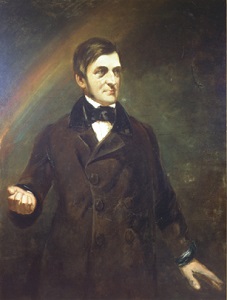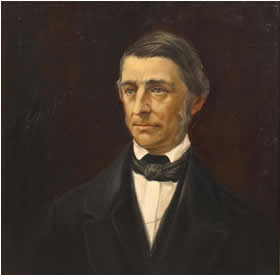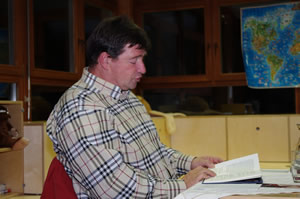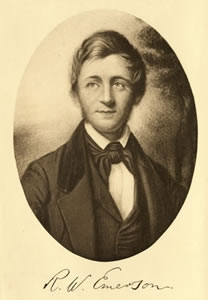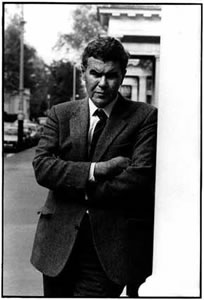De Amerikaanse dichter en schrijver Raymond Carver werd geboren op 25 mei 1938 in Port Angeles. Carver debuteerde in 1961 met zijn verhaal ‘The Furious Seasons’. De korte verhalen zijn in verschillende tijdschriften gepubliceerd en later gebundeld. De eerste bundel ‘Furious Seasons’ verscheen in 1977. Andere bundels zijn ‘Those Days’ (1986), ‘Early Writings by Raymond Carver’ (1987), ‘Where I’m Calling From: New and Selected Stories’ (1988), ‘Elephant and Other Stories’ (1988) en ‘Call If You Need Me: The Uncollected Fiction and Other Prose’ (2001). Zijn eerste dichtbundel ‘Near Klamath’ verscheen in 1968. Gebundeld: ‘In a Marine Light: Selected Poems’ (1987) en ‘A New Path to the Waterfall’ (1989). Carver ontving verschillende prijzen waaronder de National Book Award voor ‘Will You Please Be Quiet, Please?’ (1977) en de National Endowment for the Arts Fellowship for fiction in 1980. Van 1980 tot 1983 was Carver universitair docent Engels.
An Afternoon
As he writes, without looking at the sea,
he feels the tip of his pen begin to tremble.
The tide is going out across the shingle.
But it isn’t that. No,
it’s because at that moment she chooses
to walk into the room without any clothes on.
Drowsy, not even sure where she is
for a moment. She waves the hair from her forehead.
Sits on the toilet with her eyes closed,
head down. Legs sprawled. He sees her
through the doorway. Maybe
she’s remembering what happened that morning.
For after a time, she opens one eye and looks at him.
And sweetly smiles.
The Best Time Of The Day
Cool summer nights.
Windows open.
Lamps burning.
Fruit in the bowl.
And your head on my shoulder.
These the happiest moments in the day.
Next to the early morning hours,
of course. And the time
just before lunch.
And the afternoon, and
early evening hours.
But I do love
these summer nights.
Even more, I think,
than those other times.
The work finished for the day.
And no one who can reach us now.
Or ever.
Raymond Carver (25 mei 1938 – 2 augustus 1988)
De Amerikaanse schrijver en journalist John Gregory Dunne werd geboren op 25 mei 1932 in West Hartford, Connecticut. In 1954 studeerde Dunne af aan Princeton. Een aantal boeken (zoals bijvoorbeeld het draaiboek voor A Star Is Born) schreef hij samen met zijn vrouw Joan Didion, zelf ook schrijfster. Hij debuteerde in 1967 met Delano. The Story of the California Grape Strike.
Uit: Nothing Lost
„That is the end of the story.
Or almost the end.
I’m not sure I’m the one who should be telling it, but if I don’t, nobody will, so what the hell.
We live in a litigious time, and as I do not wish to be the focus of any litigation, I’ve located the major events of what follows in a state I call South Midland. By its name you can intuit a couple of things. Midland suggests the middle of the country, that part grandiosely identified as the Great Plains. South Midland suggests that there is a North Midland, as indeed there is. North Midlanders proudly claim to have the largest Paul Bunyan statue in the world, and perhaps they do, since to the best of my knowledge there are no other claimants. With that highly developed sense of humor we all recognize as indigenous to the Great Plains, South Midlanders say that the best thing in North Midland is Interstate 90 leading to South Midland. People in North Midland often group the two states together as Midlandia, but people in South Midland never do.
The biggest city in South Midland is Kiowa, which of course is Indian or, as we now say, Native American. When traveling out of state, Kiowans often refer to Kiowa as the Chicago of the north-central states. I have never heard a Chicagoan refer to his home as the Kiowa of the Midwest. Our state capital is called, with the imagination we also know as indigenous to the Great Plains, Capital City, usually shortened to Cap City.“
John Gregory Dunne (25 mei 1932 – 30 december 2003)
De Mexicaanse dichteres en schrijfster Rosario Castellanos werd geboren in Mexico-stad op 25 mei 1925. Haar jeugd bracht zij door in Comitán, in het zuiden van Mexico. Na haar reizen naar Europa en de U.S.A. waar zij haar studies in de esthetica voleindigde, keerde zij terug naar de provincie van Chiapas om te werken met Indiaanse toneelgroepen en vervolgens in het “Indigenous Institute of San Cristobal”. In een groot deel van haar werk probeerde zij de afstand te overbruggen tussen de Pre-Colombiaanse en de Europese culturele tradities van Mexico. Vervreemding en eenzaamheid werden de rode draad in haar werk zowel in haar roman “Balin Canan” als in haar gedichten verzameld in “Poesía no eres tú ” Zij schreef naast poëzie en proza ook literaire essays, en een ophefmakend feministisch toneelstuk “El eterno femenino”.
Het dagelijks bestaan
Voor de liefde, Liefde, bestaan er geen hemelen, dan deze dag;
dit droevig haar dat valt
wanneer je je kamt voor de spiegel.
Die lange tunnels
die zich mengen met het gehijg en verstikken,
de wanden zonder ogen,
de holte die weerklinkt
van een occulte en onverstaanbare stem.
Voor de liefde, Liefde, is er geen pauze. De nacht
wordt niet plotseling verdraagbaar.
En wanneer een ster verbreekt zijn ketens
en jij haar ziet zigzaggen, en dol verloren gaan,
is er geen wet die haar haken losmaakt.
De ontmoeting gebeurt in het donker. In de kus
mengt zich de smaak van tranen.
En in de omhelzing vervlecht jij
de herinnering van een of andere verwarring, van een of andere dood.
Destiny
We kill what we love. What’s left
Was never alive.
No one else is close. What is forgotten,
What else is absent or less, hurts no one else.
We kill what we love. Enough of drawing a choked breath
Through someone else’s lung!
There is not air enough for both of us. And the earth will not hold
Both our bodies
And our ration of hope is small
And pain cannot be shared.
Man is an animal of solitudes,
A deer that bleeds as it flees
With an arrow in its side.
Ah, but hatred with its insomniac
Glass eyes; its attitude
Of menace and repose.
The deer goes to drink and a tiger
Is reflected in the water.
The deer drinks the water and the image. And becomes
-before he is devoured – (accomplice, fascinated)
his enemy.
We give life only to what we hate.
Vertaald door Julian Palley
Rosario Castellanos (25 mei 1925 – 7 augustus 1974)
De Duitse schrijver Max von der Grün werd geboren op 25 mei 1926 in Bayreuth. Hij bezocht o.a. de handelsschool. Aan WO II nam hij deel als parachutespringer. Hij werd krijgsgevangene en kwam in 1948 vrij. Hij werd omgeschoold tot metselaar en later nog eens tot machinist in de mijnbouw. Pas in 1965 begon hij te schrijven. Hij gold als een van de belangrijkste schrijvers van literatuur uit de arbeiderswereld van na de oorlog.
Uit: Wie war das eigentlich?
Ein Schulkamerad von mir war von einem Fähnleinführer, dem Führer einer Hitlerjugendformation auf offener Straße zusammengeschlagen worden. Was war passiert?
Die Hitlerjugend unserer Kleinstadt zog im Marschtritt durch den Ort, vorweg der Spielmannszug mit Fanfaren und Trommeln, dahinter der Fahnenträger, dann die drei Züge. Mein Schulkamerad, selbst Hitlerjunge, konnte an diesem Tag nicht mitmarschieren, denn seine Mutter war krank, und er mußte für sie einkaufen gehen. Bevor er die Straße überquerte, ließ er die braune Kolonne, in der er nur zufällig nicht mitmarschierte, vorbei.
Es war Pflicht, die Fahne mit erhobenem Arm zu grüßen. Er vergaß es. Daraufhin rannte der Fähnleinführer aus der Kolonne und streckte den Jungen mit zwei Faustschlägen nieder, so daß er aus Mund und Nase blutete. Kein Wunder, denn der Fähnleinführer war achtzehn Jahre und stark, mein Schulkamerad gerade dreizehn und schmächtig.
Nirgendwo konnte er sich darüber beschweren, geschweige denn den Fähnleinführer wegen Körperverletzung anzeigen. Niemand hätte dem Jungen Recht gegeben – nicht umsonst hieß es in einem Lied der HJ: »… denn die Fahne ist mehr als der Tod.«
Die Fahne im Dritten Reich nicht zu grüßen war kein Vergehen, es war ein Verbrechen.
Ein Nachspiel hatte die ganze Sache aber doch, nämlich in der Schule. Wir lasen gerade »Wilhelm Tell« von Schiller. In diesem Schauspiel erläßt der tyrannische Landvogt Geßler eine Verordnung, daß nicht nur er zu grüßen sei, sondern auch sein Hut, wenn er durch die Straßen der Stadt getragen werde.“
Max von der Grün (25 mei 1926 – 7 april 2005)
De Canadese dichter en schrijver Alain Grandbois werd geboren op 25 mei 1900 in Saint-Casimir, Québec. Hij studeerde aan Saint Dunstan’s University in Charlottetown en tot 1924 aan de Laval University in Québec. Van 1924 tot 1939 leefde hij in Parijs. Na zijn terugkeer naar Canada werkte hij voor de Bibliothèque Saint-Sulpice in Québec. Daarnaast werkte hij voor tijdschriften als Amérique française, Poésie 46, Liaison, Liberté en La nouvelle Revue canadienne. In 1961 werd hij medewerker van de Musée provincial de Québec. Grandbois ontving talrijke literaire prijzen.
Que la nuit soit parfaite
Que la nuit soit parfaite si nous en sommes dignes
Nulle pierre blanche ne nous indiquait la route
Où les faiblesses vaincues achevaient de mourir
Nous allions plus loin que les plus lointains horizons
Avec nos épaules et nos mains
Et cet élan pareil
Aux étincelles des insondables voûtes
Et cette faim de durer
Et cette soif de souffrir
Nous étouffant au cou
Comme mille pendaisons
Nous avons partagé nos ombres
Plus que nos lumières
Nous nous sommes montrés
Plus glorieux de nos blessures
Que des victoires éparses
Et des matins heureux
Et nous avonc construit mur à mur
La noire enceinte de nos solitudes
Et ces chaînes de fer rivées à nos chevilles
Forgées du métal le plus dur
Que parfaite soit la nuit où nous nous enfonçons
Nous avons détruit tout bonheur et toute tendresse
Et nos cris désormais
N’auront plus que le tremblant écho
Des poussières perdues
Aux gouffres des néants
Alain Grandbois (25 mei 1900 – 18 maart 1975)
De Albanese dichter en schrijver Naim Frashëri werd geboren op 25 mei 1846 in Frashër. Hij werkte eerst als belastingambtenaar in Berat en daarna van 1872 tot 1877 bij de douane in Saranda. In deze tijd begon hij zijn eerste gedichten te schrijven die vanaf 1885 ook gepubliceerd werden. Behalve in zijn eigen taal schreef hij ook in het Turks, het Grieks en het Perzisch. Hij werd een van de belangrijkste schrijvers van de Albanese tijdschriften “Dituria” (1884-85) en “Drita” (na 1885), die door zijn broer Sami werden uitgegeven. Hij groeide uit tot een klassiek auteur en tot de nationale dichter van Albanië.
Oh mountains of Albania (Fragment)
Oh mountains of Albania and you, oh trees so lofty,
Broad plains with all your flowers, day and night I contemplate you,
You highlands so exquisite, and you streams and rivers sparkling,
Oh peaks and promontories, and you slopes, cliffs, verdant forests,
Of the herds and flocks I’ll sing out which you hold and which you nourish.
Oh you blessed, sacred places, you inspire and delight me!
You, Albania, give me honour, and you name me as Albanian,
And my heart you have replenished both with ardour and desire.
Albania! Oh my mother! Though in exile I am longing,
My heart has ne’er forgotten all the love you’ve given to me.
When a lambkin from its flock strays and does hear its mother’s bleating,
Once or twice it will give answer and will flee in her direction,
Were others, twenty-thirty fold, to block its path and scare it,
Despite its fright it would return, pass through them like an arrow,
Thus my wretched heart in exile, here in foreign land awaiting,
Hastens back unto that country, swift advancing and in longing.
Vertaald door Robert Elsie
Naim Frashëri (25 mei 1846 – 20 oktober 1900)
Standbeeld in Tirana
De Britse schrijver, criticus en politicus Sir Edward Bulwer-Lytton werd geboren in Londen op 25 mei 1803. Op zeer jonge leeftijd verloor hij zijn vader. Als voorbereiding voor de Cambridge University studeerde hij Latijn, Grieks, geschiedenis en retoriek in Ealing. In 1820 werd Ismaël: An Oriental Tale gepubliceerd. Hoewel de verkoop zeer mager was, kreeg hij toch erkenning voor dit werk van Sir Walter Scott. In 1822 ging hij naar het Trinity College in Cambridge. Als lid van de Union Debating Society ontmoette hij onder andere Thomas Babington Macaulay, Alexander Cockburn, W.M. Praed, Charles Villiers, F.D. Maurice, Charles Buller, en Benjamin Hall Kennedy. Tijdens zijn jaren in Cambridge publiceerde hij Delmour; or, A Tale of a Sylphid, and Other Poems. In juli 1825 kreeg hij de Chancellors medaille voor zijn gedicht Sculpture. In die periode publiceerde hij ook de roman Rupert de Lindsay en zijn dichtbundel Weeds and Wildflowers.Tussen 1827 en 1835 schreef Bulwer-Lytton romans, gedichten en toneelstukken. Hij schreef ook artikels en kritieken in o.a. de New Monthly Magazine, The Edinburgh Review en de Westminster Review. In 1831 werd hij verkozen als parlementslid. Bulwer-Lytton was minister van Koloniën van 1858 tot 1859.
Uit: Leila
„It was the summer of the year 1491, and the armies of Ferdinand and Isabel invested the city of Granada. The night was not far advanced; and the moon, which broke through the transparent air of Andalusia, shone calmly over the immense and murmuring encampment of the Spanish foe, and touched with a hazy light the snow- capped summits of the Sierra Nevada, contrasting the verdure and luxuriance which no devastation of man could utterly sweep from the beautiful vale below.
In the streets of the Moorish city many a group still lingered. Some, as if unconscious of the beleaguering war without, were listening in quiet indolence to the strings of the Moorish lute, or the lively tale of an Arabian improrvisatore; others were conversing with such eager and animated gestures, as no ordinary excitement could wring from the stately calm habitual to every oriental people. But the more public places in which gathered these different groups, only the more impressively heightened the desolate and solemn repose that brooded over the rest of the city.
At this time, a man, with downcast eyes, and arms folded within the sweeping gown which descended to his feet, was seen passing through the streets, alone, and apparently unobservent of all around him. Yet this indifference was by no means shared by the struggling crowds through which, from time to time, he musingly swept.“
Edward Bulwer-Lytton (25 mei 1803 – 18 januari 1873)
Portret door Henry William Pickersgill
De Amerikaanse schrijver, filosoof en essayist Ralph Waldo Emerson werd geboren in Boston, Massachusetts op 25 mei 1803. Zie ook mijn blog van 25 mei 2007.
Uit: Self-Reliance
“I read the other day some verses written by an eminent painter which were original and not conventional. The soul always hears an admonition in such lines, let the subject be what it may. The sentiment they instil is of more value than any thought they may contain. To believe your own thought, to believe that what is true for you in your private heart is true for all men,–that is genius. Speak your latent conviction, and it shall be the universal sense; for the inmost in due time becomes the outmost,–and our first thought is rendered back to us by the trumpets of the Last Judgment. Familiar as the voice of the mind is to each, the highest merit we ascribe to Moses, Plato, and Milton is that they set at naught books and traditions, and spoke not what men, but what they thought. A man should learn to detect and watch that gleam of light which flashes across his mind from within, more than the lustre of the firmament of bards and sages. Yet he dismisses without notice his thought, because it is his. In every work of genius we recognize our own rejected thoughts: they come back to us with a certain alienated majesty. Great works of art have no more affecting lesson for US than this. They teach us to abide by our spontaneous impression with good-humored inflexibility then most when the whole Cry of voices is on the other side. Else, to-morrow a stranger will say with masterly good sense precisely what we have thought and felt all the time, and we shall be forced to take with shame our own opinion from another.”

Ralph Waldo Emerson (25 mei 1803 – 27 april 1882)
